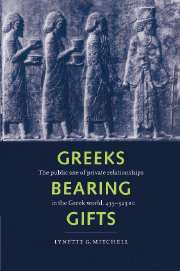Book contents
- Frontmatter
- Contents
- Preface
- Abbreviations
- 1 Philia
- 2 Philia and the polis
- 3 Philia and political activity
- 4 Magisterial appointments: Sparta
- 5 Magisterial appointments: Athens
- 6 Persia and the Greeks
- 7 Athenians and Thracians
- 8 Philip and the Greeks
- 9 Alexander
- 10 Friendship and ideology
- Appendix I Magistrates with connections
- Appendix II Notes on magistrates for the years 435–323 BC
- Bibliography
- Indexes
4 - Magisterial appointments: Sparta
Published online by Cambridge University Press: 06 July 2010
- Frontmatter
- Contents
- Preface
- Abbreviations
- 1 Philia
- 2 Philia and the polis
- 3 Philia and political activity
- 4 Magisterial appointments: Sparta
- 5 Magisterial appointments: Athens
- 6 Persia and the Greeks
- 7 Athenians and Thracians
- 8 Philip and the Greeks
- 9 Alexander
- 10 Friendship and ideology
- Appendix I Magistrates with connections
- Appendix II Notes on magistrates for the years 435–323 BC
- Bibliography
- Indexes
Summary
Whoso boasteth himself of a false gift is like clouds and wind without rain.
Proverbs 25.14There were a number of factors which could influence selection for magisterial appointments. At Athens selection for military and diplomatic posts was by popular election, a process which automatically favoured those prominent in the community, and therefore the upper classes, a fact reflected in how many important politicians were ambassadors and generals. Similarly at Sparta magistrates were chosen from among the families that formed a privileged subset of the Spartiates.
On diplomatic missions, there was the expectation that a city would be represented by men of repute. Isocrates wrote that ‘the Athenians sent to the more factionalised [of the cities] those of the citizens with the greatest repute among them’. Herodotus says that Megabazus sent as messengers the seven Persians who were most notable after himself, and Diodorus that the Spartans sent as ambassadors to Athens in 369 the most illustrious men.
Wealth was also a desirable attribute in ambassadors: for example, Tellias, ambassador to Centoripa, was the richest man in Acragas, and Sperthias and Bulis, Spartan envoys to Persia, were from families of noble birth and great wealth. Ability was also important: Plutarch advises that one should take a good orator as one's colleague on an embassy; Gorgias the rhetorician was sent on a mission to Athens on the grounds that he was the most able of all the Leontines; and Philomelus of Phocis chose the best qualified (euthetotaton) of his friends for embassies to Athens, Sparta and Thebes.
- Type
- Chapter
- Information
- Greeks Bearing GiftsThe Public Use of Private Relationships in the Greek World, 435–323 BC, pp. 73 - 89Publisher: Cambridge University PressPrint publication year: 1998

